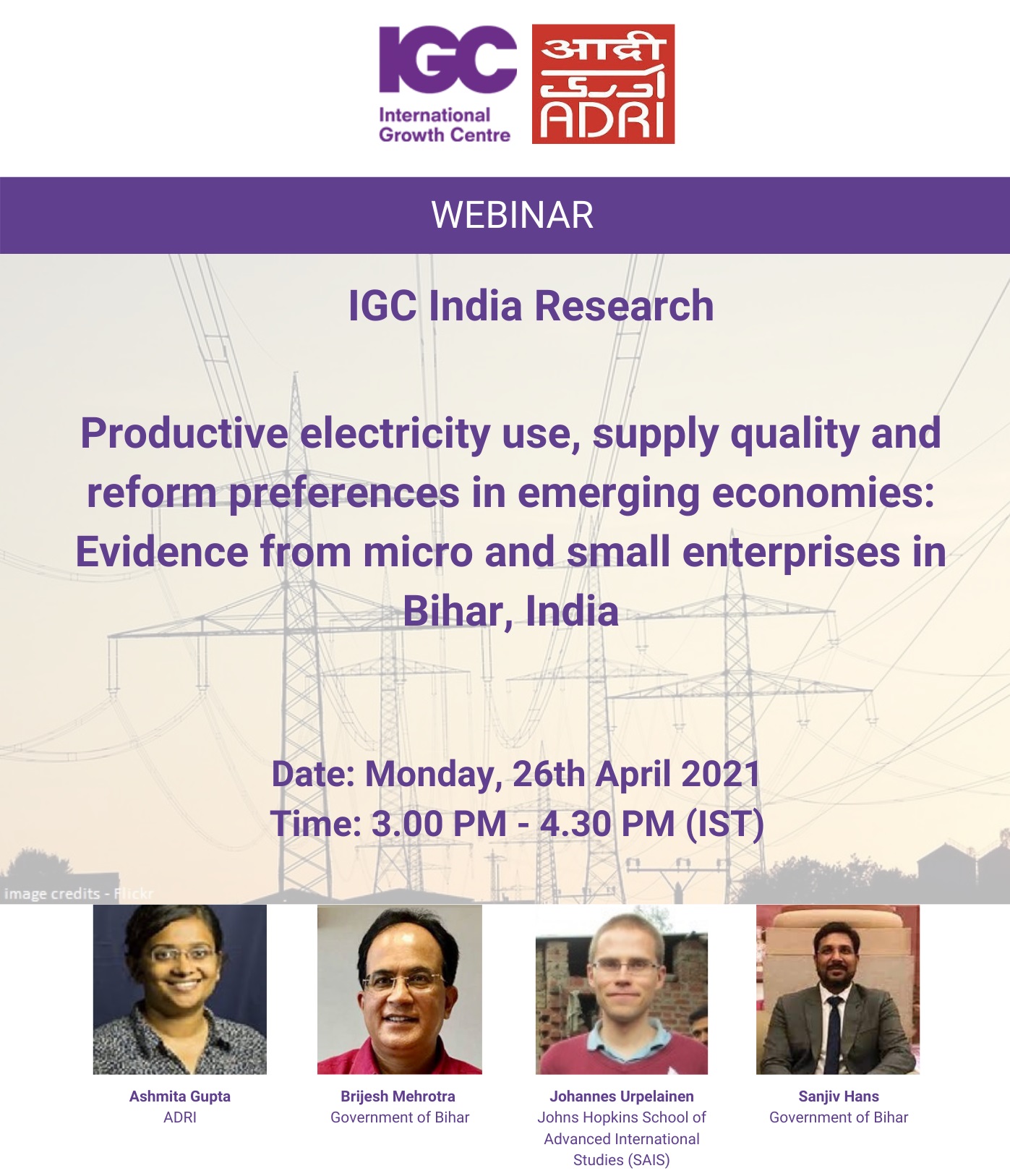Events of IGC

Title: Productive electricity use, supply quality and reform preferences in emerging economies – Evidence from Bihar
Speaker: Johannes Urpelainen is the Director and Prince Sultan bin Abdulaziz Professor of Energy, Resources and Environment at Johns Hopkins SAIS and the Founding Director of the Initiative for Sustainable Energy Policy (ISEP). Johannes is the award-winning author of four books and over a hundred refereed articles on environmental politics, energy policy, and global governance. He teaches action-oriented classes on energy and environmental policy to equip the next generation of global leaders with deep knowledge, advanced analytical skills — and a passion for transformational social change. As one of the world’s top energy policy experts, Johannes frequently advises governments, international organizations, and the private sector on energy and environment.
Date and Time: 26th April 2021 at 15.00 to 16.30 (IST)
Zoom Link for Registration: Registration Link
Webinar ID: 925 8902 8737
Open Link: https://zoom.us/j/92589028737
Abstract: Productive electricity use is one channel by which improvements in electricity supply led to economic development in emerging economies. While our understanding of household electricity supply in emerging economies is improving, less is known about productive electricity use among micro- and small enterprises (MSEs), an important provider of jobs and livelihoods. Here we describe electricity use, supply and reform preferences among MSEs using primary surveys (N = 696) from Bihar, India. We find that reported grid electricity supply reliability is quite good, providing on average 18.7 hours of electricity per day and less than one day with blackouts or voltage fluctuation per month. Nevertheless, 40% of the sampled firms have no grid connection and 75% consume less than one kilowatt-hour per day to power basic appliances including lighting, phone charging, and fans. Using a conjoint experiment to explore firm preferences for their electricity supply, we find that supply-side improvements are unlikely to drive significant increases in electricity consumption, though worsening supply will certainly have a negative effect. Low levels of wealth among the sampled firms constrains both their capacity to afford connection to the national grid, and to purchase appliances and equipment once they have the connection. While electricity supply appears sufficient, demand-side policy intervention is likely necessary to stimulate productive electricity use among Bihari MSEs.
Patna, April 26th. The International Growth Centre (IGC) and Asian Development Research Institute (ADRI) organised a webinar titled “Electricity Access among Small Firms in Bihar”. The panel was moderated by Ashmita Gupta (ADRI) and event panellists were Sanjeev Hans (Secretary, Energy Department, Government of Bihar) and Johannes Urpelainen (Johns Hopkins School of Advanced International Studies).
Access to electricity represents a challenge for firms across India. Poor electricity access disrupts supply chains and incentivizes firms to invest resources in backup generators. Slower production and extra expenses affect firms’ margins. Research shows that India’s manufacturing sector loses 5-10% every year because of electricity shortages.
Johannes Urpelainen stated that in Bihar, Small and Medium Scale Industries (SMEs) that are connected to the grid report that the quality of electricity supply is high, providing on average 18.7 hours of electricity per day and less than one day with blackouts or voltage fluctuation per month. Despite these, there are several issues pertaining to electricity access. First, grid connection among MSEs remains far from universal. 59% are connected to the grid, 24% use off-grid technologies, and the remaining 17% do not use electricity whatsoever. 75% consume less than one kilowatt-hour per day to power basic appliances including lighting, phone charging, and fans. The most common reasons cited for not having grid connections were cost which was stated by more than 50% of the respondents and no perceived need was stated by 35% of the respondents. Some of the policy recommendations suggested by Johannes are - 1) Reduce grid connection costs for small firms and evaluate the benefits of lower electricity prices in a pilot study. 2) Use distributed power generation to energize small firms where grid connection is expensive or infeasible. 3) Increase electricity consumption with access to credit and consumer demand simulation. With all these, in the post COVID19 world, Bihar will achieve the desired outcomes.
Sanjeev Hans stated that the findings are quite relevant to the reality of Bihar. In Bihar, it’s hard to find industrial and housing areas. The state government is able to provide the kind of power (electricity) quality to these micro enterprises as per the needs. The Government of Bihar initiated lots of policy interventions from January 2020. At present, people in Bihar are able to apply online for getting electricity connections. He also mentioned that demand stimulation only happens when the Industry Department takes the lead with some benefits for the MSMEs in connection with the Energy Department. He also stated that common utility areas need to be established for dedicated feeders. With these, Bihar situation will improve soon.
Professor Prabhat P Ghosh, Member Secretary, ADRI gave the vote of thanks.